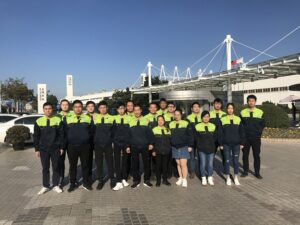What Are the Different Types of Vibration Isolators?
Vibration isolators are critical components in industrial equipment. Understanding the different types of vibration isolators will help you select the best products to improve equipment performance and longevity.There are various types of vibration isolators on the market, including rubber isolators, metal spring isolators, hydraulic isolators, and pneumatic isolators. Each type has unique benefits, providing effective vibration control and noise reduction tailored to different needs.Let’s take a closer look at these different vibration isolator types and their specific applications.
Rubber Vibration Isolators: Powerful Vibration Isolators
Rubber vibration isolators are widely used due to their excellent elasticity and vibration absorption capabilities.
Rubber isolators absorb vibrations and reduce mechanical noise in devices like pumps and fans.
Rubber vibration isolators are ideal for many industries that require high vibration isolation. Their elasticity helps absorb vibration energy and reduce operational noise, making them the preferred choice for manufacturing industries. They are also durable, offering long-lasting performance for low-frequency vibration applications.
Metal Spring Vibration Isolators: High Load and Temperature Resistance
Metal spring vibration isolators are known for their exceptional load-bearing capacity and long-term stability, making them ideal for high-load and high-temperature environments.
These isolators are capable of handling heavy loads and do not age easily, making them suitable for industrial machinery.
Metal spring vibration isolators are widely used in industrial heavy-duty equipment and machinery, such as compressors and generators. These isolators offer continued vibration isolation and stability even in harsh environments. The springs’ robust properties provide consistent performance, ensuring machinery operates smoothly and with minimal vibration.
Hydraulic Vibration Isolators: Precision and Stability
Hydraulic vibration isolators are designed for high-precision control and stable performance, making them suitable for high-load applications.
Hydraulic isolators use liquid flow and pressure changes to absorb vibration and provide stable control.
These isolators are commonly used in aerospace, military, and precision machinery, such as hydraulic presses and large machine tools. Their unique working principle allows precise control of vibration propagation, making them ideal for applications requiring fine control and stability.
Pneumatic Vibration Isolators: Flexibility and Adjustability
Pneumatic vibration isolators provide flexibility by adjusting internal air pressure to handle varying vibration intensities.
These isolators adjust based on the vibration needs of different systems, offering customizable isolation solutions.
Pneumatic vibration isolators are used in transportation systems, construction sites, and large equipment. Their adjustability allows for excellent vibration isolation in dynamic environments. The ability to adjust pressure in real-time ensures these isolators provide optimal performance in fluctuating load conditions.
What Are Vibration Isolation Methods?
Vibration isolation methods involve various technologies to isolate and reduce the transmission of vibration.
Common vibration isolation methods include spring isolation, rubber isolation, and air isolation, each with its own set of advantages and applications.
Choosing the right vibration isolation method depends on the vibration source and the environment. For instance, Spring Vibration Isolators are ideal for high-load applications, while Rubber Vibration Isolators are better suited for low-frequency isolation. Understanding the isolation method can help you choose the most effective solution for your equipment.
What Is a Good Vibration Isolator?
A good vibration isolator not only reduces vibrations effectively but also enhances the equipment’s stability and lifespan.
High-quality vibration isolators should have excellent vibration absorption, durability, and adaptability, meeting specific environmental demands.
When choosing a vibration isolator, consider its load-bearing capacity, resistance to aging, and whether it can operate in extreme environments. A good isolator can significantly reduce maintenance costs and downtime, ensuring that the equipment runs smoothly and efficiently.
What Are the Different Types of Isolation Systems?
Isolation systems are widely used in many industrial sectors, and different types of systems can be selected depending on the specific requirements.
Common isolation systems include spring isolation systems, rubber isolation systems, air isolation systems, and composite isolation systems.
Each isolation system has unique benefits. For example, Twin-Tube Vibration Isolators are suitable for high-frequency vibrations, while Mono-Tube Vibration Isolators work better for low-frequency isolation. Composite systems combine multiple techniques, offering a comprehensive solution to vibration control. Selecting the right isolation system improves equipment stability and operational safety.
Choosing the right vibration isolator and isolation system is crucial for improving equipment efficiency. Understanding the characteristics of each type can help you make the best decision for your specific needs.





